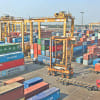$14b export data puzzle is unnerving

You can lie with data or illuminate the truth with data. And there's something in between -- half-truths.
A $14 billion correction in export figures by the central bank is necessary because it addresses one economic half-truth.
But half-truths are unnerving.
The data revision that came on Wednesday through a regular update on the balance of payments raises disturbing questions about the country's economic performance and the policy that revolved around it.
The shocking revelation has sent economists scrambling for answers, but there are more questions than answers as the authorities are almost silent.
What's clear is that the discrepancy in export figures again underscores the importance of accurate macroeconomic data. A lack of statistical accuracy can upend many indicators. The calculation of gross domestic product is one of them.
Such a big discrepancy is "unbelievable", said MK Mujeri, an economist and former director general of the Bangladesh Institute of Development Studies.
Export and import data calculation is a simple task, but big mistakes such as this by officials raise questions over the authenticity of other components of the economy. "Entire GDP estimates should be revisited," said Mujeri.
His stance concurs with the views expressed by other economists.
"If the ratio of this discrepancy has significantly increased over time, then that should necessitate revisiting the growth estimates," said Ashikur Rahman, principal economist at the Policy Research Institute of Bangladesh.
With the disclosure, some other issues came to a head as well.
The statistical revision suggests that Bangladesh Bank and the finance ministry have finally accepted that no significant export earnings are retained abroad as exporters have claimed for years. That means the trade deficit is much larger than originally presumed. That also indicates that the target of reaching $110 billion in exports by 2027 is far from realistic.
"In other words, we should now formulate a more realistic export strategy and identify what exact constraints are hindering our export performance," Ashikur said.
The difference between export figures calculated by the Export Promotion Bureau and Bangladesh Bank persisted for at least 12 years, with the gap crossing $12 billion in fiscal 2022-23.
Economists have long been referring to the puzzle. Finally, the central bank woke up and reconciled the mismatch for the July-April period of fiscal 2023-24. As a result, exports fell 6.8 percent during this period, a sharp contrast with a 3.93 percent growth shown in the EPB's figures released earlier.
What's more, Bangladesh runs the risk of reputational damage abroad. The country's image as a garment powerhouse defined by the sheer volume of shipments will be seriously dented. Clothing exports, which make up about 10 percent of the economy, are an important indicator that sets the country apart from its peers.
SOME ESTIMATES ARE OBSOLETE NOW
It is going to create serious data chaos. Whatever Bangladesh has estimated in the past has now become "mostly irrelevant", said Fahmida Khatun, executive director of the Centre for Policy Dialogue.
The EPB publishes figures based on the data from the customs department. Apparently, for procedural reasons or otherwise, the customs department took into account the same export data more than once in many cases, known as double or triple counting.
As per the EPB data, exports were $47.47 billion in the July-April period of fiscal 2023-24. However, the amount stood at $33.67 billion after the correction, according to data released by the central bank on Wednesday.
But it's not clear for how long such wrong data entry has been going on.
Good policy framing depends on authentic data. Poor quality data gives wrong signals to the policymakers.
"If policymaking is done based on unreliable data, then policies become irrelevant and defunct," Fahmida said. Unfortunately, citizens have been misled about the real economic situation due to such anomalies perpetuated by government organisations, she said.
These errors show the extent of data governance or a lack of it in Bangladesh. Without quality information, informed policy-making is difficult, said MA Razzaque, chairman of the Research and Policy Integration for Development.
The export data mismatch will have an impact on GDP estimates because value addition from exports is included in the GDP calculation. The ratio of value addition is nearly 60 percent. So, the GDP impact will be as much as $6 billion, Razzaque said.
Md Deen Islam, associate professor of economics at Dhaka University, said this correction would lower the GDP growth rate, with exports contributing less to overall economic output, GDP growth rates for the period will need to be revised downward, and future projections for economic growth will need to be adjusted to reflect the more accurate export figures, potentially leading to more conservative growth estimates.
The significant revision could create temporary confusion and mistrust among stakeholders, including businesses, investors and international partners, he said.
"Revisions might lead to questions regarding the credibility and reliability of economic data published by national agencies," he added.
Deen Islam said policymakers may need to reassess their strategies to stimulate economic growth and stabilise the macroeconomic environment as the revised export figures indicate a significant decline.
However, the reconciliation of export data provides a more accurate picture of Bangladesh's economic landscape, which is crucial for effective policy-making and strategic planning, said Deen Islam.
Birupaksha Paul, a professor of economics at the State University of New York, said it was a positive move toward a proper accounting of the balance of payments.
A senior official of the EPB said it does not produce export data. The agency compiles export data based on numbers it receives from the customs wing of the National Board of Revenue and the central bank.
"We only see export data once the goods are shipped. If any consignment is returned, the EPB does not have the chance to find that out," he said, adding that it is monitored by the BB and NBR.
"Still, if we need to correct any data, we will do it," said the official. There is a committee comprising representatives from the EPB, the BB, the NBR and other agencies.
The EPB is yet to release data for the July-June period of FY24 although it usually publishes the figures early every month.
Saiful Islam, executive director of Bangladesh Bank, said from now on, the central bank will base the calculation on the corrected export data.
Asked about the previous mismatch in data between the BB and the EPB, he said there was no problem with the past data. There was a problem with the method of reporting. He did not elaborate.
Despite the big reset, the economy's health remains unchanged. The correction addresses anomalies but does not fundamentally alter the economic landscape.
[Refayet Ullah Mirdha and Md Mehedi Hasan contributed to this report]

 For all latest news, follow The Daily Star's Google News channel.
For all latest news, follow The Daily Star's Google News channel. 







Comments